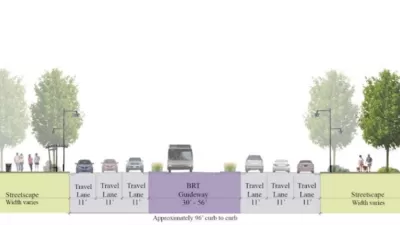No, this isn't a story about alien invaders, but rather an innovative form of housing that may revolutionize how aging Americans spend their final years.

At 88, Viola Baez is an unlikely pioneer. But as the first first private inhabitant of a MedCottage, she's the reluctant resident of a shed-size dwelling that may offer an attractive balance between independence and special care for some of the 72 million Americans who will be 65 or older in less than twenty years, reports Fredrick Kunkle.
"The MedCottage, designed by a Blacksburg company with help from Virginia Tech, is essentially a portable hospital room. Virginia state law, which recognized the dwellings a few years ago, classifies them as 'temporary family health-care structures.' But many simply know them as 'granny pods,' and they have arrived on the market as the nation prepares for a wave of graying baby boomers to retire."
Viola's "pod" is 12x24 feet, blending bedroom, kitchenette, foyer and bath "the way that a fork and spoon combine to form a spork."
"The idea for the MedCottage came from the Rev. Kenneth J. Dupin, a minister in southwest Virginia who wondered why Americans didn’t take better care of their elders," says Kunkle. "He created N2Care, a company that designed the MedCottage with help from the Virginia Tech Corporate Research Center. They stuffed its steel shell with the latest in biometric and communications technology, and crafted its features using universal design principles to accommodate people of all ages and people with disabilities."
Although the cottage doesn't come cheap (it retails for $85,000), it compares favorably to "assisted-living facilities that charge $40,000 or more a year."
FULL STORY: Pioneering the granny pod: Fairfax County family adapts to high-tech dwelling that could change elder care

Planetizen Federal Action Tracker
A weekly monitor of how Trump’s orders and actions are impacting planners and planning in America.

San Francisco's School District Spent $105M To Build Affordable Housing for Teachers — And That's Just the Beginning
SFUSD joins a growing list of school districts using their land holdings to address housing affordability challenges faced by their own employees.

The Tiny, Adorable $7,000 Car Turning Japan Onto EVs
The single seat Mibot charges from a regular plug as quickly as an iPad, and is about half the price of an average EV.

Seattle's Plan for Adopting Driverless Cars
Equity, safety, accessibility and affordability are front of mind as the city prepares for robotaxis and other autonomous vehicles.

As Trump Phases Out FEMA, Is It Time to Flee the Floodplains?
With less federal funding available for disaster relief efforts, the need to relocate at-risk communities is more urgent than ever.

With Protected Lanes, 460% More People Commute by Bike
For those needing more ammo, more data proving what we already knew is here.
Urban Design for Planners 1: Software Tools
This six-course series explores essential urban design concepts using open source software and equips planners with the tools they need to participate fully in the urban design process.
Planning for Universal Design
Learn the tools for implementing Universal Design in planning regulations.
Smith Gee Studio
City of Charlotte
City of Camden Redevelopment Agency
City of Astoria
Transportation Research & Education Center (TREC) at Portland State University
US High Speed Rail Association
City of Camden Redevelopment Agency
Municipality of Princeton (NJ)





























